|
Three Elm Lane / Golden Garden
Golden Green
01732 851748
https://whatpub.com/bell
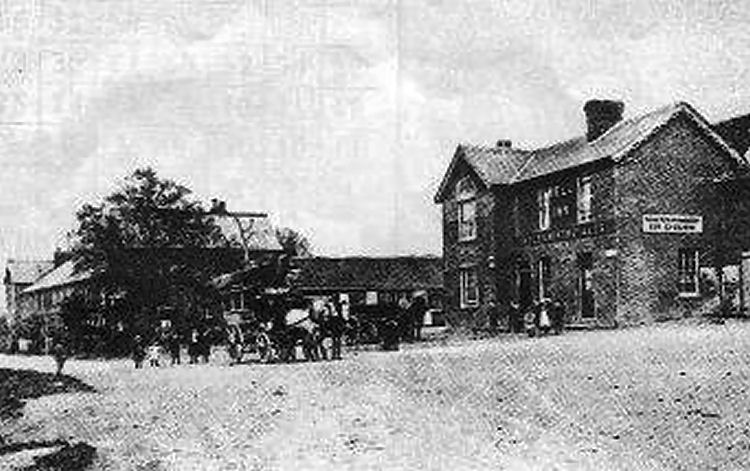 Above
photo, date unknown. |
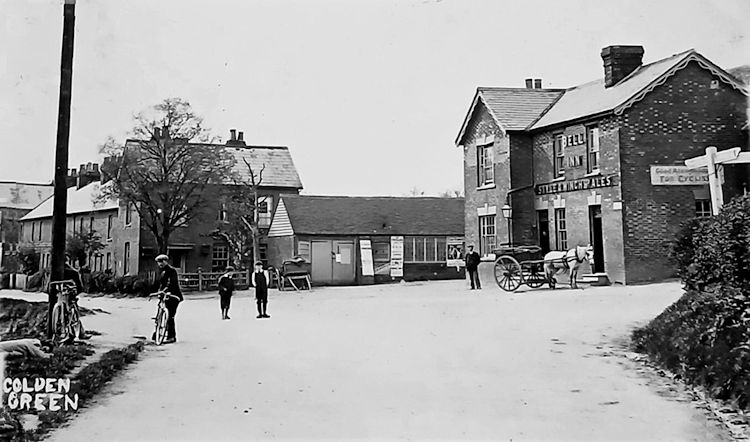
Above postcard, circa 1906, kindly sent by Rory Kehoe. Whilst the pub
signage shows very clearly that the Bell was a Style & Winch tied house,
it's odd that this photograph has been redacted, so that the road sign
offers no directional information. I wonder why this was thought
necessary? |
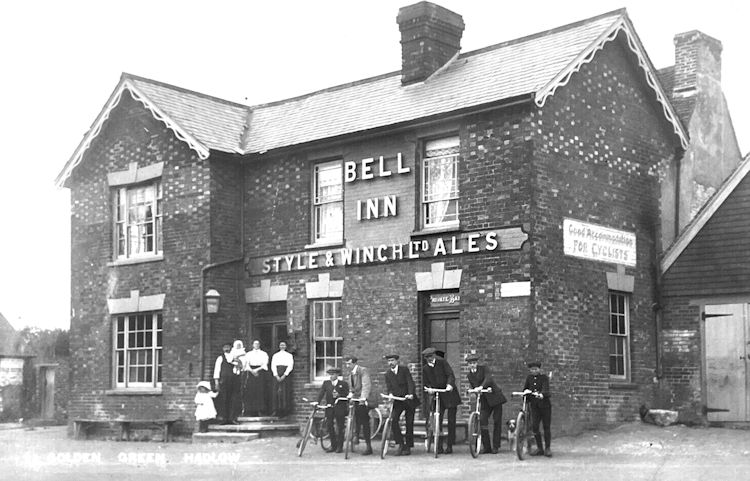
Above postcard circa 1907, showing the Bell in its Style & Winch livery.
Evidently, the Bell was a popular port of call for local cycling clubs
in the Edwardian era. Kindly sent by Rory Kehoe. |
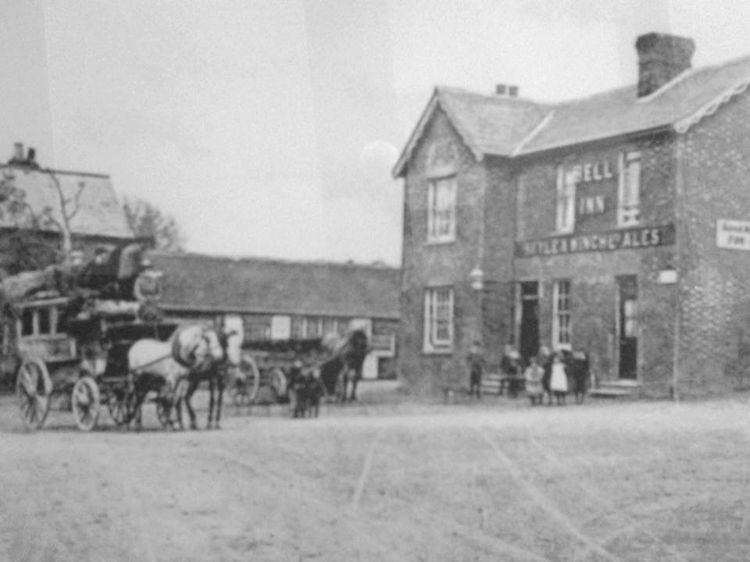
Above postcard, circa 1910, kindly sent by Hugh Potter. |
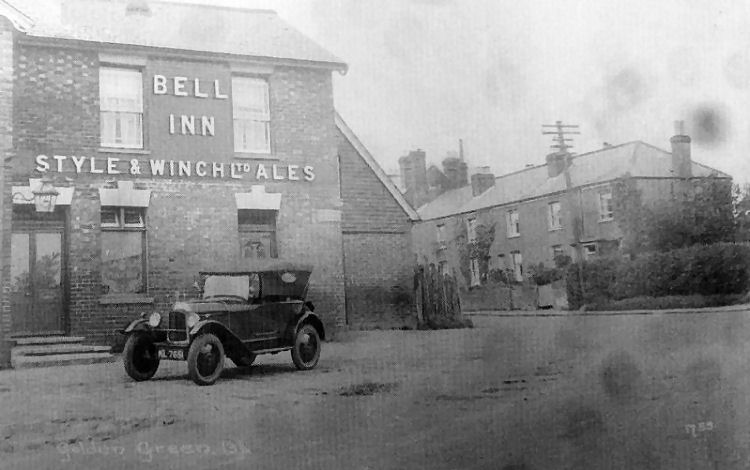
Above photo, 1935, kindly sent by Rory Kehoe. The car parked outside
the Bell is a Citroen, KL7651, which was supplied by Roote's Ltd,
Maidstone, to a Miss Corke, of Bower Cottage, Sole Street, earlier that
year. |
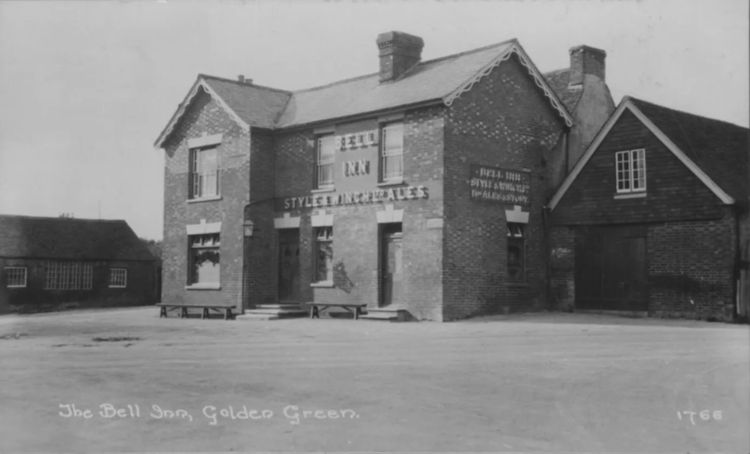
Above postcard, 1936. Kindly sent by Rory Kehoe. In the livery of
Style & Winch's Medway Brewery, Maidstone. |
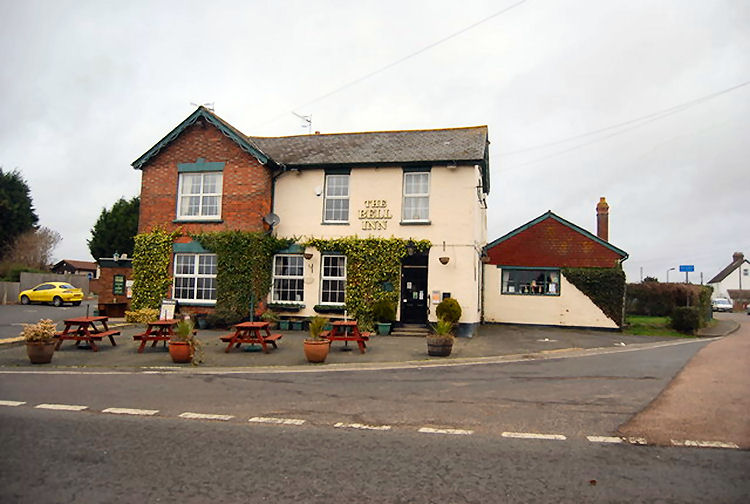
Above photo 2011 by N Chadwick
Creative Commons Licence. |
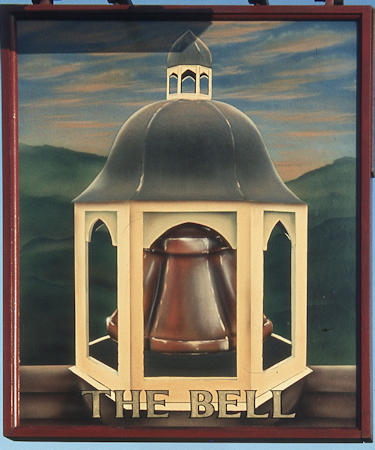
Above sign 1983.
With thanks from from Roger Pester
www.innsignsociety.com |
Situated at the corner of Three Elm Lane and Victoria Road, the "Bell
Inn" is now (2015) the only pub in Golden Green. It was mentioned in the
Domesday Book and has always been a part of the village.
In October 1853, the Inn was the venue for the inquest on the deaths of
thirty hop-pickers who drowned in the River Medway at Hartlake when the
wooden side of the bridge collapsed as they crossed in a farm cart. Their
monument stands in St. Mary's Churchyard, Hadlow.
The building gained a Grade 2 listing on 29 January 1990.
|
From the The Kentish and South Eastern Advertiser 25th
October 1853.
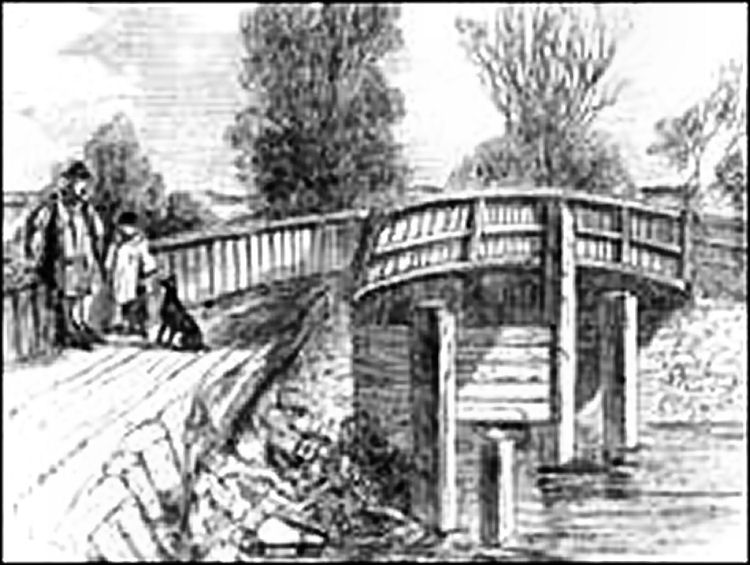
Above showing the Hartlake Bridge.
The inquest was held on Saturday 22nd October at the "Bell Inn" in Golden
Green which was the nearest available public room to the scene of the
disaster. It was held before D N Dudlow Esq, coroner and a jury of 12 local
people, also present were a solicitor and a manager representing the
Medway Navigation Company who had overall responsibility for the upkeep
of the bridge. Before the proceedings began the coroner made it clear
that should the jury find that there had been any negligence or
carelessness that charges of manslaughter could ensue. The proceeding began with eye witness accounts of the accident and the
events leading up to it. Heavy rainfall for several days had caused
flooding in the area and water was laying on the roads to a depth of
several feet. Consequently the farmer who had employed the pickers, Mr Cox of Hadlow,
provided a wagon and a pair of horses so that they might be transported
back in relays to their lodging without getting wet. The bridge itself
was not under water as it had a high crown, but the approach roads on
either side were submerged. The first journey passed uneventfully but when they were passing over
the bridge for the second time the horses shied, the wagon slipped and
the wheels of the wagon broke through the boards that skirted the wooden
structure. Despite the best efforts of the driver to pull the wagon clear it
finally overturned throwing the occupants into the swollen river. Eleven
of the passengers managed to scramble to safety but 35 others were
quickly drawn below the surface of the fast flowing waters. Despite the
best attempts of a party of men who quickly arrived on the scene from Mr
Cox's farm no more survivors were found. The jury and other members of the inquest then visited the scene of the
disaster together with the newspaper reporter who described the scenes
they witnessed at the rivers edge:- "We found groups of the bereaved friends and relatives
standing about in mute despair - others with animated gesticulations
were describing the terrible catastrophe - some with long poles were
probing the eddies and backwaters of the river for those that were lost.
A little bareheaded shoeless girl was pointed out to us as having lost
father and mother and infant brother. One man (Hearn) had lost 14
relatives - another whose face and mien were the personification of
grief itself, threw a piece of wood to direct the men with poles to the
spot where he had last caught a glimpse of his drowning wife. Only six
of the bodies had been found; and 30 more it was believed were then to
be discovered. It is scarcely possible to perceive a more distressing
sight." Newspaper reporter describing the scene at Hartlake Bridge:-
Back at the "Bell Inn" later in the afternoon they heard more evidence,
this time about the condition of the bridge. Some local witnesses
submitted that they considered the bridge to be in a dangerous state as
a number of the timbers were rotten and a Mr Johnson from Mereworth said
that he always went the long way home rather than use the bridge. The coroner himself also admitted that he didn't use the bridge but his
reason was that when horses heard their hooves on the resonant wood they
were likely to become restive and frightened. The jury subsequently left the room to consider their verdict. On
readmission they returned their verdict to the effect that the deceased
were accidentally drowned, and in the opinion of the jury:- "the
accident arose entirely from the defective state of the road and the
wooden bridge, and their dangerous construction, which ought before have
been remedied." Considering the tragedy to be an accident absolved of any responsibility
in spite of the fact that the bridge was 'defective' and a 'dangerous
construction' effectively denied the victims families the possibility of
obtaining any recompense from the local Medway Navigation Company. The glorious days of hand hop picking finally came to an end during the
1960s after a period of intensive agricultural mechanisation that had
begun during the second world war. |
|
South Eastern Gazette, 25 October 1853.
Hadlow.
Melancholy Accident at Heart Lake Bridge.
32 persons drowned.
One of the most melancholy accidents that has ever happened in this
part of the country occurred at Heart Lake, near Hadlow, on the
night of Tuesday Thursday last. Mr. Cox, who is a large farmer
there, had a number of hoppers in his employ, principally strangers.
Mr. Cox has farms both in Hadlow and Tudely, and the accommodation
for lodging his hoppers appears to be in the latter place. When they
have been picking in Hadlow, Mr. Cox has been in the habit of
causing them to be conveyed in wagons too the place in which the
hopper-houses are situate, and it was on the occasion of their being
so conveyed that the lamentable accident which we are about to
describe occurred.
On the nights of Thursday the pickers left the work that work about
six o'clock, and two wagons were employed to convey them to Tudely.
The way lay over Hart Lake Bridge which, crosses the River Medway,
and at which spot the current was, owing to the light heavy rains,
remarkably strong. The bridge is guarded on both sides by a wooden
fence, which appears to have been in a very insecure and dangerous
state. The danger was not so apparent, however until after the
accident, when the wood in some places was observed to be quite
rotten. The water was on Thursday so high in the road leading to and
from the bridge, as to oblige the persons entrusting with their care
of the wagons to ride on the horses whilst crossing. The first
wagon, which was filled with home dwellers, principally living at
Tudely, had passed over in safety, and the second, which contained
about 40 persons, was in the act of doing so, and had nearly crossed
it, when one of the horses stumbled, which caused the wagon to be
drawn against the fencing of the bridge - the fence immediately gave
way, and nearly all the unfortunate creatures were precipitated into
the water. About 32 met with a watery grave, the survivors being in
a most frantic state of excitement and terror. The persons in charge
of the horses escaped, as did the horses also, the harness having
broken before the wagon went into the water. The bodies of six of
the poor creatures have been found, and an inquest was on Saturday
last held at the "Bell Inn," Golden Green, Hadlow, before J. N.
Dudlow, Esq., and a respectable jury, of whom Mr. Thomas Kibble, of
Green-trees was foreman, when the following evidence was given.
The names of the person's found were Charlotte Leatherland, age 55;
Nora Donovan, 31; Comfort Leatherland, 23; James Mancer, 18; Selena
Herne, 4; and Kitty Roach, 22.
Dennis Collins deposed:- I live in Rosemary Lane, London, and am a
labourer. I knew Nora Donovan and Kitty Roche, two of the persons
who were drowned on Thursday. I also knew Nora Donovan; she was
about 30 years old. On Thursday last I was picking hops in the
ground belonging to Mr. Cox, in Hadlow. There was a wagon drawn by
two horses, in which I rode. There were from 28 to 30 persons in the
wagon with me, as near as I can say, but I am not certain as to the
exact number; Nora Donovan was one of them. We went down towards the
river. The water was out in the road; I expect it was from a foot
and a half or two feet. I was sitting sideways, and could not see
what happened. When we were more than half over the bridge, I heard
a cracking, and as soon as I heard it I was thrown into the water. I
heard a good many persons Halloing in the water. I cannot swim, but
was saved by laying hold of a piece of the bridge. I think one of
Mr. Cox's men helped to save me. I did not see any of them in the
water, but heard them Hallowing under the bridge. I saw a part of
the bridge broken; it was on the left-hand side going down. I did
not see anything more of the wagon. It was about half past six at
night, and getting dark.
Fanny Leatherhead deposed:- I live at Notting-hill, London.
Charlotte Leatherhead and Samuel Leatherhead, who were drowned,
where my mother and father; Comfort Leatherhead was my sister; she
is also drowned; she was 24 years old. There were nine of us, six
have been found. I dare say there were 40 persons in the wagon,
which was as full as it could be. The driver was sober and riding on
the first horse; he might have walked over the bridge if he liked;
there was no water on the bridge; it was out on this side of the
road. We went from the Hadlow side of the bridge. The water was up
to the horses knees at the foot of the bridge. The driver could not
walk on this side for the water. When we got nearly over, the hind
shoes slipped, and the driver tried to pull his head round to the
other side of the road, but before he could do so or get down to
turn it, one wheel came against the side of the bridge and broke it,
and we were tipped over into the water. It was no fault of the
driver; he tried all he could to prevent it. He saved my life by
telling a person to take hold of my hand and pull me out of the
water. The horses seemed to be quiet enough. There was a great
quantity of water coming down the river. When I was in the water the
people came tumbling upon me like hailstones. I caught hold of the
harness of the hind horse, which was the means of me my being saved.
I was sitting in front of the wagon, and could see perfectly well
how the accident happened. James Mancer was my cousin's
brother-in-law. I knew Selena Herne, she was my sister's daughter,
and was four years old.
By the Foreman:- I have ridden that way before, when the same man
was a driver. It was not the same morning as the accident happened.
He drove very carefully; I believe they were the same horses.
William Clearey deposed:- I live in Woolwich, and I am a native of
Cork. I knew the several persons who were lying in the shed, having
been with them at hopping. I was sitting in the four part of the
wagon when the accident happened. There were about 40 persons in the
wagon; about 32 have been drowned. On Thursday night, at about 6
o'clock, we left the hop ground where we had been picking, to go
home. Our way lay over the bridge. For about 6 or 7 yards on this
side there was no water out. Before we came to the bridge the water
was up to the horses knees. The man who was driving was obliged to
ride; the wagoner rode on the hind horse. When we got close to the
bridge someone gave one of the horses a touch, which made it jump a
little, but it did not slip. The hind horse held back; as we were
crossing the bridge the horse kept too close to the corner, and the
wagon went against the bridge which gave way. I heard the fence
crack first. I think it was the hind wheel that struck the fence;
the wagon went over immediately. The wagon and the people were
tipped into the water. I was sitting on the off side of the wagon
and could not see the wheels on the other side. I had been over the
bridge several times before in the same wagon. The drive was sober
on the night of the accident. The water was running very strong at
the time, and we could not see the banks.
John Lawrence deposed:- I live in Capel parish, under Mr. Cox, to
whom I am bailiff, on Thursday last I was employed as a measurer to
the hop pickers. They left the ground at about a quarter past six in
the wagon drawn by two horses. John Waghorne was the driver. He had
no mate with him; he had taken one lot of hoppers home before. I
went to the latter wagon, in the hind part on the off side. From
this side of the bridge the water was out in the road to a depth of
two or three feet. There were so much out that the driver could not
walk. The Wagoner rode on the fore horse, and Benjamin Hearne rode
on the hind one. The horses went very steadily indeed. As I sat on
the hind part of the wagon I could see the wheels. The water
extended to about half a rod of this side of the bridge. It was out
also on the Tudely side. If the driver had got off at the foot of
the bridge he would have got into deep water when he got over, so
that he would not have command of the horses. On the crown of the
bridge the hind horse made a stumble, and one of the wheels began to
lower. It is usual to skid the wheel in going over the bridge with a
heavy load. The wagon gathered on the near side and appeared to
overpower the horses. The driver endeavoured to get the horses on the
offside as much as he could. The near hind wheel appeared to go
between the slab on which the posts were fixed and the earth. This
was, I think, before the side of the bridge was struck. The near
hind wheel struck the bridge; I did not hear a crack at any time,
and as the wheel was sinking I saw the fence giving why. The persons
in the front of the wagon were thrown over the heads of those
behind. The wagoner was quite sober, and is a steady man; he drove
as carefully as he could.
By the Coroner:- I do not know that any representation has been made
as to the state of the bridge. The timber appeared to be in a rotten
state. The side fence did not appear to the eye to be firm. I was
not thrown into the water, for seeing the wagon going I jumped out.
All those who were thrown into the water was soon carried away by
the force of the current. There was an attempt made to save those in
the water, but none were got out whilst I was there.
Henry Knight deposed:- I live at Peckham, in Camberwell, Surrey. On
the night of the accident I was riding on the wagon. When the
accident happened I was talking to my child about the water, and my
attention was directed away from the horses. I think the horses got
two near two the side, which caused the wagon to run against the
fence and broke it away. The bridge has been greatly out of repair
for three or four years. The timber was decayed, and the fence too
slight; it was not safe to go over. I think there were about 32
persons lost altogether; 16 of the Leatherlands' party, 10 who lived
in the Irish shed, 5 in the hovel, where I sleep, and 1 in a stable.
Benjamin Hearne (a perfect personification of Dickens's "Poor Joe,")
deposed:- I have no regular place of residence but I am at present
living at Tudely. I was riding on the hind horse when the accident
occurred. When we had got to the top of the bridge and were going
down on the other side, the hind horse tripped against one of the
irons, and before it recovered itself the ground gave way and the
wagon went over, and shot the people into the river. I was thrown
into deep water. All the fault that I could see was in the road.
John Waghorne deposed:- I live in Hadlow, and am wagoner to Mr. Cox.
On Thursday night I was employed to drive the hoppers home. I had
been once and had come for the second lot. I don't know how many
people there were in the wagon. I rode on the front horse, the water
was so high that I could not walk. We have got nearly over when one
of the horses stumbled, by kicking against one of the irons across
the bridge; it could not recover itself. I tried, as did also the
man who was on it, to help it, but we could not succeed. The wheel
sank before the fore wheel struck the fence. When the hind wheel
sunk the wagon fell against the fence and drove it right through. My
horses are very steady, I did not put on a skid pan. I have been
over with a heavier load, and have not used one. The bridge has
looked bad for a long time. I have never complained myself about it,
but have heard other people complain. The weight in the wagon when
the accident happened was about two tons. Have driven it over the
bridge with four tons on it.
Mr John Bowles, of Tudeley in the room, on being asked his opinion
of the state of the bridge, said it had been out of repair for 8 or
10 years. It was dangerous; the rails for all loose. He knew that
Mr. Johnston, of Mereworth Castle, had gone round by Tunbridge
rather than cross the bridge.
Mr. William Goreham, who attended to watch the proceedings on behalf
of the Medway Company (to whom the bridge belongs,) stated that no
complaint had ever been made to the company of the want of repair of
the bridge; had any such been made, it would have been entered on
the minutes and received immediate attention.
Mr. Halloews, manager of the Medway Company, gave similar testimony.
The Coroner remarked, that when an accident occurred it was very
easy to say that it might have been prevented, but it was not always
possible to foresee such events. He would not pretend to give an
opinion whether the bridge was faulty or dangerous, but it was quite
clear that the side of the bridge was not strong enough to resist
the weight which had been pressed against it. In the present
condition of the force it was perceptible that it was decayed, but a
casual observer might not have been able to detect the fact before
it came down. The result, however, shewed that the bridge was not in
a proper state, and that it was requisite to take some steps to
repair it. In his opinion, instead of a fence, it was requisite to
have a good stout wall with a parapet.
The room was then cleared, and after a deliberation of about half an
hour the jury returned the following verdict:- "That the deceased
were accidentally drowned; and the jury are of opinion that the
accident arose entirely from the defective state of the road and the
wooden bridge, and the dangerous state of its construction, although
the defects ought to have been before remedied. And they recommend
that it be forthwith replaced by substantial construction of brick
or stone. It was stated in the room that a similar accident occurred
on the bridge about 26 years ago, on which occasion a light cart
which was being driven over the bridge by a man named Gower was
precipitated into the river. Gower was returning from Chapel with
his wife, child, and a servant girl, and all were drowned except the
girl, who managed to escape.
It is supposed that there will be a subscription in the
neighbourhood on behalf of the relatives of the sufferers on the
present occasion.
The body of the girl named Lorna Herne was found during the sitting
of the inquest, and up to Sunday the total number of bodies found
amounted to 18. The whole of those these were buried yesterday
(Monday) morning at Hadlow church. On Sunday a concourse of persons,
computed at upwards of 2000 visited the scene of the fearful
calamity. One more body was discovered yesterday morning.
|
|
Kentish Gazette, 14 March 1854.
Hadlow.
An inquest was held on Tuesday last at the "Bell Inn," Golden Green,
Hadlow, before the coroner for that division, and a highly respectable
jury, of which Mr. Joseph Osborne was foreman, touching the death of Ann
Homewood, the wife of Stephen Homewood.
Stephen Homewood deposed:— The deceased was my wife; we were drinking
together at the "Bell Inn," on Saturday night last. My wife left about
ten o’clock, and I went home about half-past eleven. I found my wife
lying on the bed with her clothes on; her frock was undone. I asked her
if she was ill; she said her head was bad. I got into bed with my
clothes on, and fell asleep; on awaking in the morning I found she was
dead. Deceased had complained of her head for some time past, and had a
fit five weeks ago. A sister of the deceased (Mrs. Beech) deposed, that
her sister came to her house about ten o’clock on Saturday night. She
complained of her head. Witness left her in her house, went out for
about 20 minutes, and met the deceased going into her own house. On her
return, deceased asked her if her husband was coming home. She told her
she thought he was. She bid her good night, and saw her no more alive.
She found that the deceased had been sick in her house during her
absence.
George John Vine, Esq., surgeon, of Hadlow, deposed, that he was called
in about six o’clock on Sunday morning. He found the deceased quite
dead, but not cold. From the appearance of the face it was quite evident
the deceased had died from suffocation, by lying on her face in the bed,
without power of moving. There were no marks of bruises on her body, and
it was his opinion that congestion of the brain ensued from the
before-mentioned cause.
Verdict:- "Died from natural causes.”
|
|
From the Kent and Sussex Courier. 8 August 1873. Price 1d.
HADLOW. A MIXED UP ASSAULT CASE.
Albert Morris, carrier, of Tonbridge, was summoned for assaulting Joseph
Taylor, stone-mason, of Golding Green, at Hadlow, on the 26th July last.
Mr. Warner stated the circumstances, he appearing in support of Taylor,
and said that a cross-summons had been taken against complainant by
defendant's wife. Complainant said that on Saturday the 26th ult., he
and a Mr. Jeffery called at the "Bell," Golding Green, on their way from
Tonbridge. There they saw the defendants wife, to whom he had never
spoken but once, and then she accused him of having been with bad women
which he denied. He and Mr. Jeffery had some ale at the bar. Mrs. Morris
repeated the charge against him, but he took no notice of her, and
turned his back upon her. She, however, repeated the accusation, and he
told her to go away as it was not the first time she had insulted him.
She had the appearance of having had a little to much too drink. She
caught hold of his coat and he told her she was a bad woman. She then
pulled him round and he gave her a push. She then fell down and said she
would fetch her husband. Mr. Jeffery and witness went away and had got
as far as Mr. Jeffery's house when defendant came up and asked witness
why he had struck his (complainant's) wife. Witness replied he did not,
but she had insulted him and asked defendant to hear what he had got to
say. Defendant refused, and struck witness under the eye with such force
that he fell down, and was rendered insensible. In falling he had his
hands and face cut. In answer to the defendant he denied that he fought
four rounds with him, or that he bunted him with his chest and nearly
bit his nose off. Edward Jeffery, blacksmith, Golding Green, said he had
been summoned by defendant to give evidence. He corroborated the
complainant's evidence. He said that after the blow he didn't think
Taylor knew what he was doing. Taylor got up two or three times and
defendant knocked him down each time. After defendant went away Mrs.
Morris went back and again abused complainant. Defendant said his wife
told him the complainant had hit her, and he was very much annoyed. When
he got up Taylor bunted him and then he struck him. The complainant
Taylor was then charged with assaulting Deliah Morris at the same time
and place. Mrs. Morris said she accompanied her husband to the "Bell,"
Golding Green, and was speaking to the landlady when the defendant
called in. He said, "Holloa Missus how are you?" when she replied "How
is the old woman you was with when I turned you out of my stable?"
Defendant then said "If you say that again I will knock you down." A
man who was with him (Jeffery) said, "Don't hit the woman," and then
witness repeated the accusation. Taylor then knocked her down, and she
told her husband. Her husband then went after the defendant who had gone
up the road, and said he should not hit him but summons him, Taylor then
met them ‘full butt' and her husband asked him why he had hit his wife,
adding that if he wanted to fight he should fight him. They then fought
but she could not say who struck the first blow. By Mr. Warner:- Had
lived under Taylor for four years. Taylor spoke first. She denied that
she took hold of his coat or put her hand on him. Taylor knocked her on
the side of the head and she fell. She denied that after the assault she
went up to defendant and again assaulted him. Mrs. Farmer, the landlady,
was called to prove the assault, but she only saw Mrs. Morris get up
from the floor. She did not see her take hold of Taylor, but she
believed Miss. Morris" spoke first. Jeffery repeated his evidence. The
Bench dismissed the last case, and fined the defendant (Morris) in the
first case £1 and 15s. costs, which he paid. |
|
From the Kent and Sussex Courier. 12 September 1873. Price 1d.
STEALING UMBRELLAS.
John Harnley, labourer, of Fulham, aged 26, was charged with stealing,
at Hadlow, on the 7th instant, two umbrellas, value 2s. 6d., the
property of Henry Beach. Prosecutor, a labourer, said that on Sunday evening he was at the "Bell
Inn," Golden Green, when he saw the prisoner and several other people
there. He had two umbrellas with him, and these he placed behind the
table. At about twenty minutes to ten o'clock a young man called in and
asked if any one had lost an umbrella, and witness, on looking round,
saw that his umbrellas had been taken. The prisoner had left a short
time previously. Witness next went to Mr. Fanner, the landlord, to whom
the prisoner had given up the umbrellas. Witness identified the
umbrellas produced as his property. William Wamett said that on Sunday evening he was in front of the "Bell
Inn," at about half-past nine, when he saw the prisoner go by with two
umbrellas. The prisoner went from the direction of the taproom to a tree
in front of the house, and then returned. Witness and his mate went
towards the tree, when the prisoner stopped them and asked them to have
a pint of ale. Witness, however, went to the tree, where he saw the two
umbrellas, and these prisoner took in to the landlord, telling him not
to deliver them up to anybody until he came for them. Witness afterwards
went in the taproom and asked if anybody had lost any umbrellas. The
prisoner refused to go to the landlord to ask for the umbrellas to be
given up, and a policeman was then sent for. George Farmer, the landlord of the "Bell Inn," said that he received the
two umbrellas from the prisoner on Sunday night last. He asked witness
to take care of them until the next morning, and not to give them to
anyone but himself. He kept them until the police called, when he gave
them up. P. C. Horton said he apprehended the prisoner, who acknowledged that he
had taken the umbrellas. The Bench sentenced the prisoner to seven days' imprisonment with hard
labour. The father of the prisoner asked the Bench to inflict a fine, offering
to pay as much as £6, but the Bench refused to listen to his liberal
offer to contribute to the county exchequer, and the prisoner, who
turned to his wife and father and told them he should be out on
Saturday, was removed in custody. |
|
From Barclay, Perkin's Anchor Magazine, Vol XVII, No.9, September 1937.
Kindly sent by Rory Kehoe.
OBITUARY.
Mr. J. Wells, on August 18th, tenant of Messrs. Style & Winch Ltd., at the
"Bell," Golden Green, near Tonbridge, since 27th February 1912.
Mr. A. H. Godden, on August 7th, tenant of the Dartford Brewery Co. Ltd., at
the "Prince of Wales," Hunton, near Maidstone, since 3rd February 1932. |
|
From the
https://www.kentlive.news By Andy Robinson, 15 August 2019.
Tonbridge pub The Bell Inn had 'dirty' kitchen and food past its use-by date.
Food hygiene inspectors gave it a rating of 2 after mould was found growing on a tomato puree nozzle.
A pub in Tonbridge was given a food hygiene rating of two after
inspectors found the kitchen to be "generally dirty" and containing
items past their use-by date.
Environmental Health Officers visited The Bell Inn in Three Elm Lane,
Golden Green on May 16.
Their report has been obtained from Tonbridge and Malling Borough
Council by Kent Live through an FOI.
The officer states they could not find any food safety management
system.
Some food was found to be two days past its use by date. Smoked ham
trimmings and a margherita pizza both had use-by dates of May 14.
Tomato puree also had mould growing around the nozzle and lid.
Hand contact points such as the microwave handle and dial, light
switches, fridge handle and fryer handle were dirty, yet the soap at the
hand wash basin had run out.
The top of the ice machine also needed cleaning.
The kitchen and its equipment was found to be "generally dirty" and in
need of an "in depth clean", according to the environmental health
officer.
A rating of two means improvement is necessary so the authority decided
a revisit would be the appropriate form of action.
At the time of writing, the Food Standards Agency website says the pub
has a food hygiene rating of 2.
|
LICENSEE LIST
ELDON John 1858-62+ (also builder age 61 in 1861 ) )
FARMER George 1871-82+ (age 36 in 1871 ) )
PARKER Henry Jan/1886-91+ (age 55 in 1891 ) )

WOOD Harry 1901+ (age 33 in 1901 ) )
COWTAN Ernest Bourner 1903+

BROMLEY Charles 1911+ (age 47 in 1911 ) )
WELLS James 27/Feb/1912-18/Aug/37 dec'd
BURROW Franis Norman 1938-39+ (age 31 in 1939)
https://pubwiki.co.uk/Bell.shtml
 From the Kelly's Directory 1903 From the Kelly's Directory 1903
 Kent
and Sussex Courier Kent
and Sussex Courier
 Census Census
|








